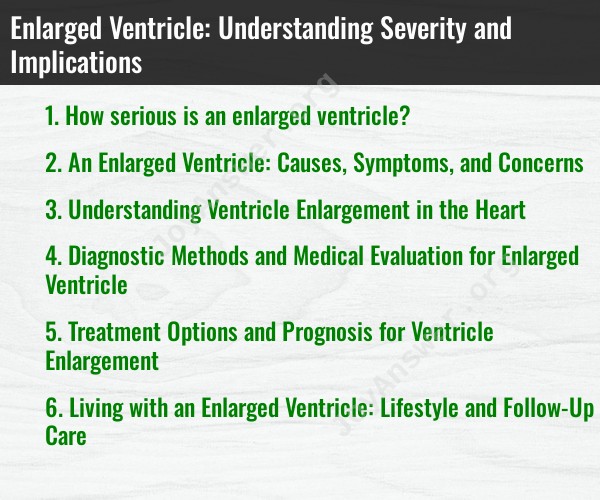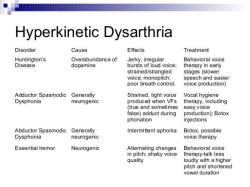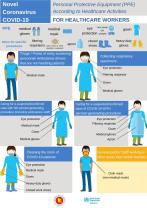How serious is an enlarged ventricle?
The seriousness of an enlarged ventricle in the heart depends on several factors, including the underlying cause, the extent of enlargement, and the individual's overall health. An enlarged ventricle can be a sign of an underlying heart condition, and the implications can range from mild and manageable to severe and life-threatening. Here are some key points to consider:
Underlying Cause: An enlarged ventricle is often a consequence of an underlying heart condition. Common causes include hypertension (high blood pressure), heart valve disease, cardiomyopathy (disease of the heart muscle), and heart failure. The severity of the underlying condition significantly influences the seriousness of an enlarged ventricle.
Extent of Enlargement: The degree of ventricular enlargement matters. Mild enlargement may not have a significant impact on heart function, while severe enlargement can lead to impaired pumping ability and reduced cardiac output.
Symptoms: The presence and severity of symptoms play a crucial role in assessing the seriousness of an enlarged ventricle. Common symptoms of heart conditions with ventricular enlargement can include shortness of breath, fatigue, chest pain, irregular heartbeats, and swelling in the legs and ankles.
Diagnostic Tests: Physicians use various diagnostic tests to evaluate the extent and cause of ventricular enlargement. These may include echocardiography (ultrasound of the heart), MRI, CT scans, and other imaging studies. These tests help determine the underlying condition and its severity.
Treatment Options: Treatment options vary depending on the underlying cause and the extent of ventricular enlargement. Treatment may include lifestyle changes (e.g., managing blood pressure or addressing underlying causes), medications, and, in some cases, surgical interventions such as valve repair or replacement or ventricular assist devices.
Prognosis: The prognosis for an individual with an enlarged ventricle depends on the underlying cause, the effectiveness of treatment, and the individual's overall health. Some conditions may be manageable with treatment and lifestyle changes, while others may carry a higher risk of complications and require ongoing medical care.
Consult a Healthcare Professional: If you or someone you know has been diagnosed with an enlarged ventricle or is experiencing symptoms of a heart condition, it is essential to consult a healthcare professional. A cardiologist can provide a thorough evaluation, determine the cause, and develop an appropriate treatment plan.
In summary, the seriousness of an enlarged ventricle in the heart varies based on the underlying condition, extent of enlargement, presence of symptoms, and response to treatment. Early diagnosis and appropriate medical management are crucial for addressing heart conditions and minimizing potential complications.
An Enlarged Ventricle: Causes, Symptoms, and Concerns
Ventricle enlargement, also known as cardiomegaly, is a condition in which the chambers of the heart become enlarged. This can happen in any of the four chambers of the heart, but it is most common in the left ventricle, which is the main pumping chamber of the heart.
Causes of Ventricle Enlargement
There are many causes of ventricle enlargement, including:
- High blood pressure (hypertension)
- Coronary artery disease
- Heart valve disease
- Cardiomyopathy
- Congenital heart defects
- Thyroid disease
- Anemia
- Pregnancy
- Certain medications
Symptoms of Ventricle Enlargement
In some cases, ventricle enlargement may not cause any symptoms. However, when it does cause symptoms, they may include:
- Shortness of breath
- Fatigue
- Chest pain
- Palpitations (feeling like your heart is racing or skipping beats)
- Swelling in the legs and feet
- Coughing, especially at night
- Wheezing
Concerns About Ventricle Enlargement
Ventricle enlargement can lead to a number of serious complications, including:
- Heart failure
- Arrhythmia (irregular heartbeat)
- Stroke
- Sudden cardiac death
Understanding Ventricle Enlargement in the Heart
The heart is a muscular organ that pumps blood throughout the body. It has four chambers: two upper chambers (atria) and two lower chambers (ventricles). The left ventricle is the main pumping chamber of the heart. It pumps oxygen-rich blood to the body through the aorta.
Ventricle enlargement can occur when the heart has to work harder than usual to pump blood. This can happen for a variety of reasons, such as high blood pressure, coronary artery disease, and heart valve disease. When the heart has to work harder, it becomes larger and more muscular.
Diagnostic Methods and Medical Evaluation for Enlarged Ventricle
If your doctor suspects that you may have ventricle enlargement, they will likely order a number of tests, including:
- Electrocardiogram (EKG): An EKG measures the electrical activity of the heart. It can be used to detect arrhythmias and other heart problems.
- Echocardiogram: An echocardiogram uses ultrasound to create images of the heart. It can be used to measure the size and function of the heart chambers.
- Stress test: A stress test measures how the heart responds to physical activity. It can be used to diagnose coronary artery disease and other heart problems.
- Cardiac catheterization: Cardiac catheterization is a minimally invasive procedure that allows the doctor to see the inside of the heart. It can be used to diagnose coronary artery disease, heart valve disease, and other heart problems.
Treatment Options and Prognosis for Ventricle Enlargement
The treatment for ventricle enlargement will depend on the underlying cause. For example, if ventricle enlargement is caused by high blood pressure, treatment will focus on lowering blood pressure. If ventricle enlargement is caused by coronary artery disease, treatment may include medications, surgery, or a combination of both.
The prognosis for ventricle enlargement depends on the severity of the condition and the underlying cause. With early diagnosis and treatment, most people with ventricle enlargement can live long and healthy lives.
Living with an Enlarged Ventricle: Lifestyle and Follow-Up Care
If you have ventricle enlargement, there are a number of things you can do to manage your condition and improve your prognosis:
- Take your medications as prescribed.
- Maintain a healthy weight.
- Eat a healthy diet.
- Exercise regularly.
- Get enough sleep.
- Manage stress.
- Avoid smoking.
- See your doctor for regular follow-up care.
By following these tips, you can reduce your risk of complications from ventricle enlargement and live a long and healthy life.













